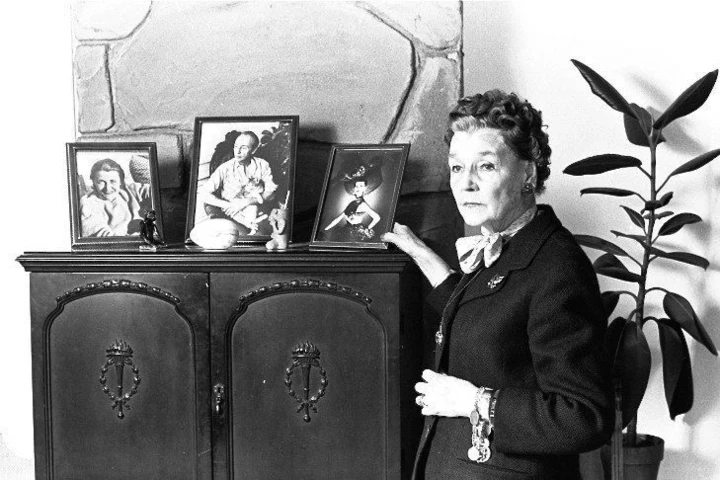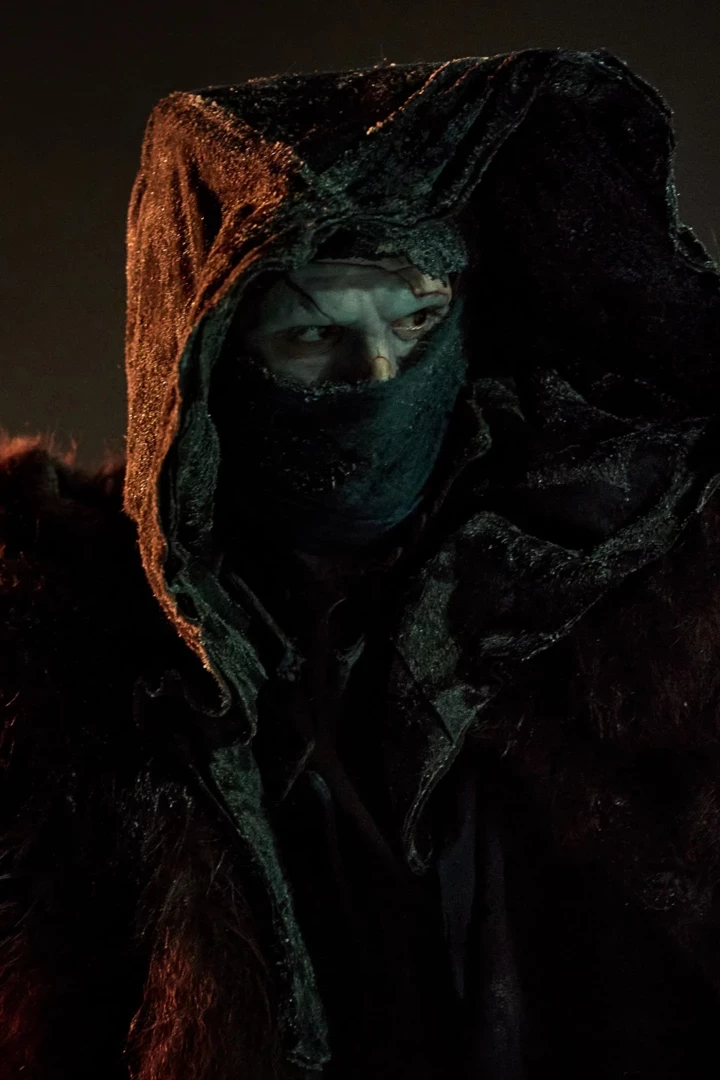
Save this storySave this storySave this storySave this story
For an entertainer, a casino gig is a double-edged sword. It can be a lucrative booking, a sign that you’ve entered a rarefied tier of bankability. But casino crowds can be tough: they’re often filled with inebriated people who are frustrated from losing money, people on a broad quest to be entertained, rather than diehard fans. Last month, the comic Matt Rife played four nights at the Ocean Casino Resort, in Atlantic City, New Jersey—a place he describes as “like if Vegas had a zombie apocalypse.” Rife has an unusually gruelling touring schedule, and he likes to assign letter grades to each show. “Tonight was fine. I would give it a B-minus, maybe,” he told me, sitting in the quiet greenroom on the first night of the run. “I knew halfway through, when certain things weren’t getting the response they usually do, that it was just that kind of crowd.”
Rife is known for his crowd work, and tonight, the sold-out venue was filled with some forty-three hundred ticket holders who wanted a rowdy back-and-forth with him. At one point in the set, Rife likened acrylic nails to Bugles. “You guys know what Bugles are?” The crowd cheered. “I didn’t know if that reference was going to land or not,” he said. “You guys are white trash. That is a gas-station chip!”
One woman in the crowd began a series of interjections. “Don’t forget about Dominican trash!” she shouted. Rife looked her way. “Does that qualify as Latina, Dominican?” “A little bit!” the woman yelled. As Rife gravitated toward other topics, the woman continued engaging him. The mere mention of certain topics would prompt a wave of shouts from the crowd that caused the show’s momentum to flag. “I’m from the middle of nowhere in Ohio,” Rife said. “Ohio! Ohio!” the crowd tittered. Eventually, Rife turned his attention exclusively to a pair of venue security guards just stage right, Mohammed and Ralph. They were safe bets for crowd work: sober, neutral parties who were being paid to protect him.
In his comedy, Rife is in a perpetual state of negging, lightly insulting crowd members in a crude kind of frat-boy flirtation. (“Your parents are from Hungary, and their daughter is from thirsty?” he once prompted a young woman.) But, off the stage, Rife has an air of Midwestern civility. He likes to answer questions with “Yes, ma’am,” and he appears eagerly attentive and thoughtful when listening. He speaks carefully about his work and his audiences, even when a show hasn’t gone particularly well, lest he be perceived as the exact kind of whiner or snowflake he routinely speaks out against in his sets. “Don’t get me wrong. I’d say eighty per cent of our shows go so smoothly . . . but the crowd work can be a little bit of a curse,” he told me. “It’s rarely the person who yells out and wants attention who ends up being the best conversation.”
Rife, who is twenty-eight, had his breakout moment just over two years ago, but he has already experienced the life cycle of a veteran comic. In the summer of 2022, after doing standup for more than a decade, he was ready to give up comedy altogether. At the encouragement of a friend, he dutifully posted a clip on TikTok from a show in Phoenix, featuring a bit captioned The Lazy Hero, in which he gently ribbed a woman in the crowd who’d called her ex-boyfriend lazy. (The ex worked in the E.R.) The clip effectively encapsulated Rife’s appeal: he tended to attract the attention of women who found him hot, a fact he capitalized on by incorporating playful audience banter into his sets. This anodyne video ended up going viral, and over the next year, he self-produced two standup specials, which have collectively racked up tens of millions of views on YouTube. Last spring, he booked a huge standup comedy tour called the ProbleMATTic World Tour, selling six hundred thousand tickets across two hundred and fifty-six shows in forty-eight hours. The streaming platforms that had been ignoring Rife for years had no choice but to embrace him, and he signed a multi-special deal with Netflix, along with a development deal for a workplace comedy.
His ascent was met with an equally expeditious fall. When his special, “Natural Selection,” débuted on Netflix last November, commenters on social media immediately decried a joke early on in the set, in which Rife made fun of a hostess at a restaurant in Baltimore who had a black eye. “ ‘They should put her in the kitchen or something, where nobody has to see her,’ ” Rife recalled his friend suggesting. “And I was, like, yeah,” he continued, “but I feel like, if she could cook, she wouldn’t have that black eye.” He then mimed the act of dipping his toe in water, looking delighted, to indicate that he was testing out the crowd.
The joke succeeded in making Rife the comic people loved to hate. At a live event, Marc Maron described him as the “new It Boy of shitty comedy”—someone who “shit on the mostly female audience that he accumulated through social media to sort of kiss up to these pseudo-edgelords.” Others pointed out that the line simply wasn’t funny. “It’s not that you’re not allowed to say something,” the comic Stavros Halkias said on a podcast. “You have to make it good.”
Rife’s cartoonishly sculpted pop-star looks, which had once been a calling card, also began attracting mockery. A plastic surgeon made a post with the hashtag #comedy about a procedure he had supposedly done, captioned: “creating the greatest jawline ever seen just for my patient to get cancelled right after.” (Rife commented on the post: “Lying about medical history is illegal, just FYI.”) Some difficult months followed: Rife was grieving the death of his grandfather, who taught him about standup, and in March, he and his girlfriend, the actress Jessica Lord, split up. He left Los Angeles, and moved to a farm he had bought in Rhode Island.
But he still had those tour dates to fulfill. Rife was scheduled for between thirty and forty shows a month, a breakneck pace that’s unusual outside of Broadway or professional baseball. By late May, he was worn out. He went several nights without sleeping, and found himself tightly gripping his stool onstage throughout his entire performance in Lincoln, California. A few nights later, he still hadn’t slept, and he cancelled two weeks’ worth of shows owing to exhaustion.
So when I met Rife in Atlantic City, he was in a curious position: he was sort of cancelled, alienated from his cohort in Los Angeles, and also one of the most popular entertainers in the country, beloved for his persona and for his familiar strain of insult comedy. As he prepared to release his second Netflix special, “Lucid,” Rife was somehow a pariah and also the most popular guy in the room.
There was another contradiction at play: Rife was someone who seemed like he was suffering from personal distress, but he had also gained adulation for rejecting what he sees as a culture of victimhood and oversensitivity. He was rehabilitating himself after a physical and mental breakdown, yet he knew that he couldn’t get away with being too self-pitying. “There are thousands of people who really think I got cancelled,” he told me. “And then there are millions out there who are like, ‘You didn’t even come close.’ ”
One reason Rife moved to Rhode Island was to surround himself with more “normal” people. “I like having normal neighbors,” he told me over Zoom, a week after his Atlantic City run. He’s no stranger to rural life, having grown up in the tiny Ohio town of North Lewisburg. Raised by his mother after his biological father died by suicide, Rife described an upbringing that sounds both grim and idyllic—most days were spent playing outdoors in creeks and cornfields, trying to avoid his stepfather, whom he says he fought with often. “I didn’t spend a lot of time in the house,” he said. “I wanted to be literally anywhere else, most of the time.” In high school, Rife’s grandfather started bringing him to local comedy clubs. At the age of fifteen, he began performing at open-mike nights himself.
Though Rife’s home town was predominantly white, three of his closest friends growing up were Black. He found this translated to an ease within Black comedy circles, and a kinship with Black comics. “I almost exclusively performed at Black comedy shows and Black clubs,” he told me. “Black comics always just gave me the opportunity: ‘Hey, you want to come do my show down the street?’ They were the first comics to ever pay me for doing stage time.” These experiences also helped shape Rife’s comic sensibility. “Nobody roasts each other like Black people,” he said. “I’ll never be as funny as a regular Black dude.” The gigs led Rife to a recurring role, often as the token white kid, on the long-running improv and battle-rap show, “Wild ’N Out.” In these old clips, you can see the roots of Rife’s jab-for-jab style. In one segment, Rife is called a “random white man” by the rapper T.I. “You been choppin’ wood, chasin’ squirrels all your life, ain’t you?” T.I. asks him. Rife pretends to crumble and tear up in response.
Beyond “Wild ’N Out,” Rife craved a bigger platform for his standup. One day, in 2021, after a meeting with Comedy Central, who “wouldn’t give him the time of day,” Rife was complaining to a friend about his stagnant Instagram follower count. The friend made a suggestion: Why not film a standup special yourself? Rife launched a GoFundMe, raised twenty-five thousand dollars, and shot an hour-long special in a dance studio in North Hollywood. With hopes of gaming online-search algorithms, Rife named the special after a topic that was buzzing at the time: “OnlyFans.” (“Matt’s very entrepreneurial,” his manager told me. “Some would say desperate,” Rife countered.) The following year, he had his breakout on TikTok.
Though Rife is now hitting all the markers of commercial success, he seems to take pride in his status as an L.A. exile. “Hollywood isn’t this gatekeeper that it used to be,” he said. He’s hoping to build a soundstage on his property in Rhode Island so that he can shoot projects with his friends. “I’ve just never been one for a lot of the people in L.A.,” he admitted. “It’s not who the majority of my fans are.” Other people in show business appeared to revel in his downfall. “Everybody stopped calling and texting, and started talking shit about me on their podcast,” he said.
One exception was Dave Chappelle, another comic who knows a thing or two about rankling the so-called online woke mobs, and about living in quasi-isolation in “normal” America. Last year, Rife got word from a mutual friend that Chappelle’s sister was a fan of his work. She wanted to know if Rife had any shows planned in Ohio. He didn’t, but he quickly booked a gig at a small club in Dayton, Ohio, a half-hour drive from where Chappelle lives in Yellow Springs, just for the opportunity to perform in front of his idol’s family. Chappelle himself didn’t show, but his sister, his wife and a crew of their friends came out. The performance led to an invitation to hang out with Chappelle, and the comics spent hours talking. Later that summer, Rife was asked to perform at Chappelle’s “Summer Camp,” an outdoor comedy series he curates each year. Rife closed out the show and received a standing ovation.
Whatever camaraderie may be missing in Hollywood can be found in the podcast studios and on the line-ups of certain disgruntled comics. There is perhaps no medium that has felt the tremors of recent culture wars quite as dramatically as standup, where a growing contingent of performers routinely groan about the expectations placed on their work. “Whether it’s depression or a physical disability, not everyone wants to be seen as a victim,” Rife told me. (He claimed that hundreds of people who had experienced domestic violence had reached out to him in support after the waitress joke.) “They also want to laugh at themselves,” he continued. “Sometimes people need to laugh to heal through the things that make them uncomfortable.”
The experience of being cancelled or taken to task over jokes, as so many comics have, has become its own form of identity to bond over. “Even when the world turned against me after the special, Chappelle was like, ‘Don’t fuckin’ give in. It doesn’t matter what you do,’ ” Rife said. “ ‘If you apologize, you still lost.’ ”
The teaser for Rife’s new special, “Lucid,” features a sketch in which a pitch meeting full of Netflix employees, all portrayed by Rife, gather and raise commonly held concerns about the comedian. “Didn’t his last special, like, totally flop?” asks a gender-nonconforming character with blue hair and a B.L.M. neck tattoo. A slovenly, heaving Rife in a fat suit says, “Only women like him, anyways.” Finally, a Netflix executive in business attire (played by Rob Riggle) sets the record straight: “The analytics are very clear. His audience is fifty per cent men and fifty per cent women, and one hundred per cent people who love comedy and aren’t whiny little bitches.” The group is interrupted by a wheezy man in a janitor’s costume—Rife, again—meant to be Marc Maron.
Countless comics have voiced some version of this complaint: that an overly touchy, “woke” culture poses an existential threat to standup, that it undermines the freedom of expression inherent to the form’s success. But the culture-warrior role presents its own limitations. “There might be a certain expectation,” Rife told me. Occasionally, he will notice a tweet from a fan along the lines of, “Hey, I’m coming to your show. I hope you just say some outrageous shit.”
For the most part, in “Lucid,” Rife tries to give his fans what they expect. At shows, he has prompted his audience members to describe their dreams—both their waking aspirations and their slumbering thoughts—as a springboard for his wisecracking. He speculates that one woman, who says she’s a pilot but declines to say for which airline, works for Spirit; he suggests that a man who dreams of pole dancing is gay. Nothing outrageous, exactly, but rude enough to make you wince. As some comedians have drifted into narrative, confessional zones, Rife has remained punchy.
But at the live show in Atlantic City, he tried out a few minutes of material on his insomnia and his struggles with anxiety. It was slower, more sincere, and perhaps a bit uncomfortable for Rife and his audience. But it was also more compelling than the raunchy and bantering style he defaults to in his crowd work. “I was going to fuckin’ die,” he said of his bout of exhaustion earlier this summer, and explained that he’s had insomnia his whole life. “If one more fucking person says, ‘Have you tried melatonin?’ . . . If it’s at CVS, I’ve almost O.D.’d from it.” He continued, “The recommendation I hate the most is when people suggest: ‘Well, have you tried meditation?’ Kill yourself. I get it. If you’re looking at meditation on paper, it is the act of calming yourself down, being present, and slowing down your brain. I get that. It’s literally the thing I can’t do.”
Despite Rife’s stated belief in laughing through the hard stuff, there are parts of his life that he won’t touch. “So often, when people ask me something about my childhood, I’ll just say something passively, and they’re like, ‘That’s fucking hilarious. You have to talk about that,’ ” Rife said of his tumultuous family life, including his “cartoon cliché of a stepdad.” But he blanches at the thought of making jokes about the experience. “I don’t really find it funny,” he admitted. “Sometimes you’re too close to it. It’s hard to find it funny when you’re in it.” ♦
Sourse: newyorker.com







